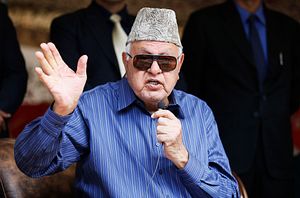A Parliament member who is a senior pro-India politician in Indian-controlled Kashmir was arrested Monday under a controversial law that allows authorities to imprison someone for up to two years without charge or trial.
Farooq Abdullah, 81, who also was the former chief minister of Jammu and Kashmir, was arrested at his residence in Srinagar, the summer capital and main city of the disputed Himalayan region.
“We have arrested him, and a committee will decide how long the arrest will be,” said Muneer Khan, a top police official.
Abdullah is the first pro-India politician to be arrested under the Public Safety Act, under which rights activists say more than 20,000 Kashmiris have been detained in the last two decades.
Amnesty International has called the PSA a “lawless law,” and rights groups say India has used the law to stifle dissent and circumvent the criminal justice system, undermining accountability, transparency, and respect for human rights.
The PSA came into effect in 1978, under the government of Abdullah’s father, who himself was a highly popular Kashmir leader.
The law, in its early days, was supposedly meant to target timber smugglers in Kashmir. After an armed rebellion started in the region in 1989, the law was used against rebels and anti-India protesters.
Abdullah’s residence was declared a subsidiary jail and he was put under house arrest on August 5 when Indian Prime Minister Narendra Modi’s Hindu nationalist-led government in New Delhi stripped Jammu and Kashmir of semi-autonomy and statehood, creating two federal territories.
Thousands of additional Indian troops were sent to the Kashmir Valley, already one of the world’s most militarized regions. Telephone communications, cellphone coverage, broadband internet and cable TV services were cut for the valley’s 7 million people, although some communications have been gradually restored.
On August 6, Indian Home Minister Amit Shah denied to the lower house of Parliament that Abdullah had been detained or arrested.
“If he (Abdullah) does not want to come out of his house, he cannot be brought out at gunpoint,” Shah said, when other parliamentarians expressed concern over Abdullah’s absence during the debate on Kashmir’s status.
Meanwhile, the Supreme Court sought a response from the central government and the Jammu and Kashmir administration on a plea seeking to produce Abdullah before the court.
Many anti-India protesters as well as pro-India Kashmiri leaders have been held in jails and other makeshift facilities to contain protests against India’s decisions, according to police officials.
Kashmir’s special status was instituted shortly after India achieved independence from Britain in 1947. Both India and Pakistan claim Kashmir in its entirety, but each controls only part of it.
India has often tried to suppress uprisings in the region, including a bloody armed rebellion in 1989. About 70,000 people have been killed since that uprising and a subsequent Indian military crackdown.
By Sheikh Saaliq for the Associated Press.

































